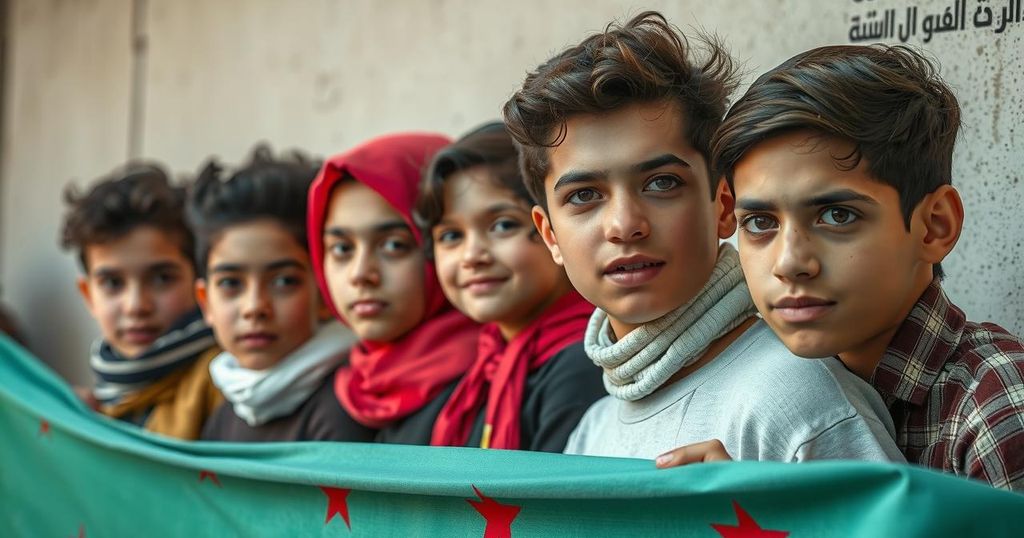Iran’s Khamenei: Syrian Youth Will Resist New Government Following Assad’s Fall
Iran’s Supreme Leader Ayatollah Ali Khamenei stated that young Syrians will resist the new government after President Assad’s fall, attributing the unrest to U.S. and Israeli interference. Khamenei emphasized the determination of Syrian youth to combat perceived insecurity and denied claims that militant groups are merely proxies of Iran.
On December 22, 2024, Iran’s Supreme Leader Ayatollah Ali Khamenei expressed his belief that young Syrians would actively resist the newly established government following the downfall of President Bashar Assad. In his speech in Tehran, he attributed the turmoil to alleged interference from the United States and Israel, claiming they orchestrated chaos to appropriate Syria’s resources. Khamenei emphasized the resilience of the Syrian youth, stating they are motivated and determined to face those he accused of fostering insecurity in the region. He rejected the notion that Iranian-backed groups were mere proxies, asserting their actions stemmed from their convictions, independent of Iranian control.
Khamenei’s statements come against the backdrop of Iran’s historically significant role in supporting Assad during Syria’s prolonged civil conflict, which has persisted for nearly 14 years. This civil war ignited in response to Assad’s violent repression of public protests against his family’s lengthy governance. Syria has served as a strategic conduit for Iranian assistance to Hezbollah, a critical ally. Recently, the dynamics have changed as Iran and its associates face challenges, particularly following Israel’s military operations against Hamas and Hezbollah, leading to a ceasefire in Lebanon. These developments could influence Iran’s standing in the region and its relations with militant factions.
The conflict in Syria, which has impacted millions and altered geopolitical alliances, remains deeply complex. It is crucial to recognize the intricate relationships within the region, particularly between Iran, Israel, and militant groups. Khamenei’s remarks highlight ongoing tensions and the narrative Iran is attempting to construct amidst shifting power dynamics. Understanding these elements is vital for comprehending the broader implications for regional stability and international relations.
“What can he do? He should stand with strong will against those who designed and those who implemented the insecurity,” – Ayatollah Ali Khamenei.
Follow AP’s Syria coverage at https://apnews.com/hub/syria.
In conclusion, Ayatollah Ali Khamenei’s address underlines his perspective on the resilience of Syrian youth amid the evolving political landscape post-Assad. His accusations against the U.S. and Israel reflect longstanding tensions and an ongoing narrative that positions Iran as a supportive ally to Syrian interests. The speech also emphasizes Iran’s strategic posture concerning its regional allies while denying allegations of reliance on proxy forces. As the situation in Syria continues to unfold, the implications for Iran and its influence in the region remain pivotal.
Iran has played a significant role in the Syrian civil war, supporting President Bashar Assad’s regime against various rebel factions. The conflict, which ignited in 2011, has resulted in a complex humanitarian and political crisis, with implications on international relations, particularly involving Iran, the U.S., and Israel. Understanding Khamenei’s perspective requires acknowledging Iran’s strategic interests in Syria as a conduit for supporting allied militant groups, including Hezbollah. Khamenei’s recent comments come in the context of mounting challenges for Iran’s influence in the region, alongside perceived threats from adversarial states.
In summary, Khamenei’s remarks highlight his conviction that Syrian youth will not passively accept a new government following Assad’s regime, attributing their potential resistance to external adversaries like the U.S. and Israel. This perspective reinforces the narrative of Iranian solidarity with perceived victimhood in Syria, while simultaneously asserting that Iran does not rely on proxy forces for influence. Understanding these dynamics is crucial in the context of ongoing regional conflicts and geopolitical strategies.
Original Source: apnews.com




Post Comment